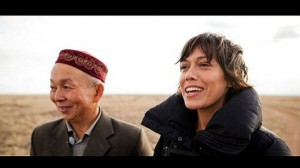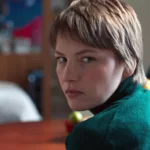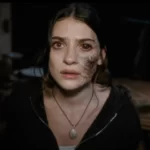It on a chance plane flight that Kimberley Joseph first heard about the devastating nuclear fallout from bombing site ‘the polygon’ in Kazakhstan. Whilst usually radioactive leaks make headlines, Joseph was shocked to find that not only was this issue top secret, but that Kazakhstan’s own government refuses to take responsibility for the surrounding villages now suffering from horrific diseases and short life expectancies. After travelling to and from Kazakhstan for 6 years, whilst juggling a successful acting career appearing on programs such as Lost, The Polygon is finally about to have its premiere in Joseph’s hometown of the Gold Coast, and alert people to this issue which deserves to be in the global spotlight.
TOM: You were brought up here [Gold Coast] – do you miss it now you’re living in LA?
Kimberley: Yeah I do – I miss the lifestyle, it’s great. LA is great, but I love coming home.
TOM: I understand you first heard about the plight of the Kazakh village affected by the Polygon nuclear testing site whilst on a random flight. Can you tell me about what your initial reaction was to hearing about such a horrific situation?
Kimberley: I was sitting next to a member of the European parliament and he had already been to Kazakhstan a couple of times. He spoke with incredible passion and I was amazed and appalled by what I’d heard which was the same reaction as he had when he first heard about it. I suppose it was top secret for forty years and Kazakhstan was one of those countries that was still becoming independent so I guess it was one of those stories that never really came out. So I remember being shocked, and I remember his enthusiasm. You always meet incredible people on planes but that was the one conversation that was life changing. At the time I didn’t know whether he would contact me [back] and he did, and then I was on a flight over there. So it’s kind of amazing when you think one conversation like that can really change your path.
TOM: You mentioned it was top secret – other nuclear disasters like Chernobyl and Fukushima were very well publicised in the news – why did this issue get swept so far under the rug?
Kimberley: Well the Soviet regime was such that the people who were being tested on – it took them a while to experience the effects of the mushroom clouds. They were probably in awe of those explosions thinking that this was Soviet might and it was amazing and we can now protect our country, but not recognizing that radioactive fallout was raining down on them. So it took them a while to register that they were getting sick and what that was from, and then once they became aware of that their hands were tied, they couldn’t speak out. If they did they would be jailed. If they did do research – one of our characters was the chief radiologist at the time and he would send teams into the villages because he know they would get sick. He was excited because Moscow would recognise that this was happening, and that they were interested in what his findings were. Of course once they got the results they shut him down. There were things like that happening all the time. Once independence came to Kazakhstan in 1991 there were so many records that had been burned or discarded and so the intensity of what happened there and the statistics – a lot of that was lost.
TOM: Did you run into any difficulty with the government whilst you were filming?
Kimberley: Not really – the Soviet Union doesn’t exist anymore so it’s very easy to say ‘we’re not responsible for it’. The thing that frustrates me is that the government in Kazakhstan is wealthy and the Kazakh government has their hand in a lot of pies and they could be doing so much for these people, and they’re not. I was shocked that I didn’t know about this story and I knew that the majority of people I was talking to didn’t know about this story and of course everyone was familiar with Borat – when you say Kazakhstan you think of Borat.
TOM: Unfortunately I am one of those people.
Kimberley: I was the same. There’s just so much more to it. I definitely felt compelled to do something, but at the same time I recognised ‘oh god, I’m a single white female. What am I meant to do?’ So telling the story through the documentary seemed like an appropriate step to take. Of course I didn’t know what I was undertaking at the time when I started – I was just like ‘yeah I’ll just bang out a documentary in 6 months.’
TOM: It was actually more like 6 years from start to finish – why did the process evolve over such an unusually long period of time?
Kimberley: I don’t think it is. A lot of people make documentaries and it takes a long time, it just does. I remember talking to my friend who did a documentary about all the ‘big’ things – like the big pineapple, the big prawn and stuff like that and she said to me ‘no, it’s going to take you a while to do this’, and I said ‘no no no, it’s going to take me like six months.’ She said ‘actually, more like 5 or 6 years’. And now here I am. Also it took us until when we went back in 2011 to get the villagers. They were still hesitant to speak to us – there is still sort of a Soviet hangover there in terms of speaking out and I don’t think their government has really stepped up to the plate yet. There’s fear about saying ‘hey, we need help and our government’s not paying attention.
TOM: Did you set out to make The Polygon with a particular endgame, such as alerting the government that this behaviour is wrong?
Kimberley: Yeah my intention was to help the people of East Kazakhstan and the people of the villages surrounding The Polygon. Of course when you go in with an intention like that it is quite overwhelming, and you think ‘how am I supposed to help?’ And then you realize the government in that country is very wealthy and that they should be stepping up so I felt as opposed to shaming them into helping, I wanted to inspire them to help. I wanted to show the villagers in a positive light but also respect that there is a need there. And they were very adamant that they were nervous to speak to people and to get interviews with them because they have been portrayed in the press in less than savoury ways. And I think there’s a little bit of fear there still. They live very simply, they live off the land – of course they don’t know what’s affected by radiation still, but it’s manageable. It’s the plutonium in the soil and it’s what you can’t see. It’s not like an oil slick where you can see the oil and the animals that are affected, radiations not like that.
TOM: Often times with documentary you go in with one idea for the film and the footage produces another – did you find the finished product of The Polygon focussed on what you’d envision from the beginning?
Kimberley: I went into it thinking I wanted to capture something dramatic that was kind of like ‘ok there’s our story’. But the people in the villages are just there, living, getting by and you get that feeling that they’ve kind of given up. The graveyards are bigger than the villages now. I didn’t set out to make a hard hitting political thing; it was much more for me about meeting these people and really getting a feel for them and their culture and history, and their plight. It’s much more a human piece about the way these villagers support each other, when the rest of the world is not supporting them.
TOM: How do you feel about the film having its world premiere tomorrow night?
Kimberley: I do feel excited and a little bit nervous getting the film out there tomorrow. It’s wonderful to be having that here in my hometown and know that everyone’s coming out to support because this is my baby. The intention was to draw attention to the people of East Kazakhstan and inspire the government to take action so I do hope that happens, and it is already starting to happen.
TOM: Other than educate ourselves about this issue, what can people do to contribute to the cause of these Kazakh villagers?
Kimberley: We are looking to petition to the mayor of the affected area. What we really want to do is get their pension age lowered to 51 because at the moment its 63 and a lot of people just don’t make it. That’s something that’s very tangible. We also have a lady who has been instrumental – she started her work after Chernobyl happened – she realized that Kazakhstan had a great need and started focussing on it. The thing is there is money being injected into the cities, and the oncology hospital there has just been refurbished. But the villagers are still not getting the money. Fiona has her foundation called The Greater Chernobyl Cause that she’s doing specifically for the villagers so we’ll work together to determine where the needs are within those villages and where we want to spend that money. It’s really important to bypass the bureaucracy…and maintain control of the funds because otherwise they’ll be misused.
The Polygon has its worldwide premiere at the Gold Coast Film Festival on April 11th – Pacific Fair Cinemas, Broadbeach.
For more information on Kimberley’s film The Polygon and the plight of the Kazakh villagers visit thepolygonfilm.com, and thegreaterchernobylcause.ie




